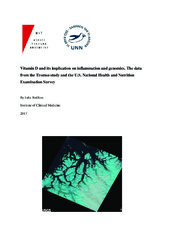| dc.contributor.advisor | Kamycheva, Elena | |
| dc.contributor.author | Beilfuss, Julia | |
| dc.date.accessioned | 2017-12-07T08:11:45Z | |
| dc.date.available | 2017-12-07T08:11:45Z | |
| dc.date.issued | 2017-11-24 | |
| dc.description.abstract | Det har vært en økende interesse for vitamin D sin rolle i patogenese av inflammasjonsrelaterte sykdommer, metabolske forstyrrelser, hjertekarsykdommer og cancer. Mange observasjonsstudier har antydet en sammenheng mellom redusert vitamin D nivå og økt risiko for disse sykdommene. Vårt mål var å undersøke denne sammenhengen i to store observasjonsstudier: den norske Tromsøundersøkelsen og den amerikanske NHANES (National Health and Nutrition Examination Survey), samt at vi har gjennomført to randomiserte studier (RCTer) for å vurdere om vitamin D tilskudd kan virke positivt på inflammasjonsmarkører. I Tromsøundersøkelsen (Tromsø 6) fant vi at redusert nivå av serum 25-hydroxyvitamin D (25(OH)D) var assosiert med høyere verdier av high-sensitive CRP (hs-CRP). Dessverre kunne vi ikke bekrefte kausal sammenheng i en RCT som gikk over 5 år, hvor vi testet om høy dose vitamin D (20 000 IU cholecalciferol per uke) kunne redusere serum hs-CRP. I en annen RCT hvor vi inkluderte overvektige personer, ble deltagerne delt i tre grupper og ble randomisert til enten høy dose cholecalciferol (40 000 IU per uke), cholecalciferol i dose 20 000 IU per uke eller placebo; og deretter fulgt i ett år. Vi fant at interleukin 6 verdiene falt, men tumor necrosis factor α og hs-CRP ikke ble redusert. Vi fant heller ingen effekt på insulinresistens. Data fra NHANES ble brukt for å studere assosiasjon mellom serum 25(OH)D og leukocyte telomere lengde (LTL). Forkortningen av telomere lengden er assosiert med genetisk predisposisjon for carcinogenese og tidlig aldring. Vi inkluderte 4260 menn og kvinner i ulike aldersgrupper og fant en positiv og selvstendig assosiasjon mellom serum 25(OH)D og LTL hos personer i aldersgruppen 40-59 år. Dette funnet støtter hypotesen om at redusert vitamin D status kan være assosiert med forøket risiko for kreft og andre aldersrelaterte sykdommer. Avslutningsvis, våre data indikerer at det er en assosiasjon mellom reduserte verdier av serum 25(OH)D og øket nivå av inflammasjonsmarkører og markører for carcinogenese og aldring. Funnene lot seg ikke med sikkerhet bekrefte i intervensjonsstudiene og den klinisk betydning av vitamin D i forebygging av inflammasjonsrelaterte og metabolske sykdommer er ikke avklart. | en_US |
| dc.description.abstract | There are several observational studies, suggesting an association between decreased vitamin D status and increased risk of cardiovascular diseases, metabolic and autoimmune diseases, and certain types of cancer. The relation between serum 25-hydroxyvitamin D (25(OH)D) and proinflammatory cytokines and some markers of carcinogenesis is still unknown and it is yet not established if supplementation with cholecalciferol reduces these markers. We used data from Tromsø study and from the U.S. National Health and Nutrition Examination Survey (NHANES) to study the association between 25(OH)D and proinflammatory cytokines and leukocyte telomere length (a marker of carcinogenesis and aging).
In the observational study based on 10.118 non-smokers from the sixth Tromsø study we found a significant negative association between serum 25(OH)D and high-sensitive CRP (hs-CRP). However, in a smaller cohort of subjects with prediabetes (n=511), there were no significant correlations between serum 25(OH)D and hs-CRP. Moreover, 5 years supplementation with 20 000 IU cholecalciferol per week did not result in significant reduction in serum hs-CRP levels, as compared with subjects receiving placebo. In another RCT, 1 year supplementation with 20 000 IU or 40 000 IU cholecalciferol, resulted in lowering of interleukin 6 (IL-6), but not hs-CRP and tumor necrosis factor-α. In another large observational study, based on NHANES cycles 2001-2002, we demonstrated the significant positive association between serum 25(OH)D and LTL, but only in middle-aged adults (e.g. age 40-59 years). The findings were independent of other risk factors for LTL shortening (e.g. age, race/ethnicity, BMI, intake of sugars and calories, physical activity, etc). These findings might provide the biological plausibility on vitamin Ds action on carcinogenesis and other ager-related conditions.
In conclusion, the results of our study indicate an association between serum 25(OH)D levels and levels of certain proinflammatory cytokines and markers of carcinogenesis and aging, but supplementation with cholecalciferol for as long as 5 years, did not show a beneficial effect of vitamin D. It means that the clinical impact of the associational findings remains unclear. | en_US |
| dc.description.doctoraltype | ph.d. | en_US |
| dc.description.sponsorship | Helse-Nord Forskningsmidler | en_US |
| dc.description | The papers 2 and 3 of this thesis are not available in Munin. <br>
<br>
Paper 2: Beilfuss, J., Jorde, R., Kamycheva, E.: “High-sensitivity CRP is associated with
serum 25-hydroxyvitamin D levels, but is not affected by 5-year supplementation with
cholecalciferol”. (Manuscript). Published version available in <a href=http://dx.doi.org/10.15226/jnhfs.2017.001108> J Nutrition Health Food Sci 2017, 5(5): 1-8. </a>
<br>
<br>
Paper 3: Beilfuss, J., Camargo Jr., C. A., Kamycheva, E.: “Serum 25-Hydroxyvitamin D
has a modest Positive association with leucocyte telomere length in middle-aged US
adults”. Available in <a href=http://dx.doi.org/10.3945/jn.116.244137> Journal of Nutrition 2017, 147:514-520. </a> | en_US |
| dc.identifier.uri | https://hdl.handle.net/10037/11812 | |
| dc.language.iso | eng | en_US |
| dc.publisher | UiT The Arctic University of Norway | en_US |
| dc.publisher | UiT Norges arktiske universitet | en_US |
| dc.rights.accessRights | openAccess | en_US |
| dc.rights.holder | Copyright 2017 The Author(s) | |
| dc.rights.uri | https://creativecommons.org/licenses/by-nc-sa/3.0 | en_US |
| dc.rights | Attribution-NonCommercial-ShareAlike 3.0 Unported (CC BY-NC-SA 3.0) | en_US |
| dc.subject | VDP::Medisinske Fag: 700::Klinisk medisinske fag: 750::Endokrinologi: 774 | en_US |
| dc.subject | VDP::Medical disciplines: 700::Clinical medical disciplines: 750::Endocrinology: 774 | en_US |
| dc.subject | VDP::Medisinske Fag: 700::Klinisk medisinske fag: 750::Geriatri: 778 | en_US |
| dc.subject | VDP::Medical disciplines: 700::Clinical medical disciplines: 750::Geriatrics: 778 | en_US |
| dc.subject | The Tromsø Study | |
| dc.subject | Tromsøundersøkelsen | |
| dc.title | Vitamin D and its implication on inflammation and genomics.
The data from the Tromsø Study and the U.S. National Health and Nutrition Examination Survey | en_US |
| dc.type | Doctoral thesis | en_US |
| dc.type | Doktorgradsavhandling | en_US |


 English
English norsk
norsk

